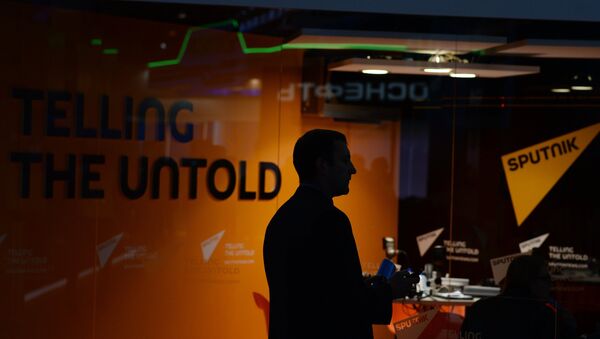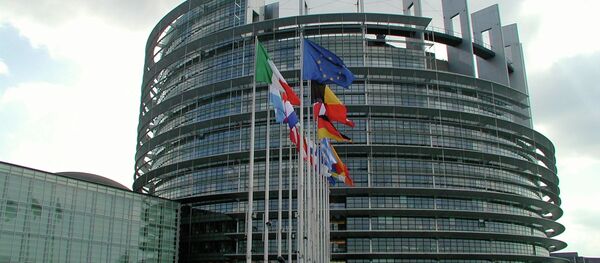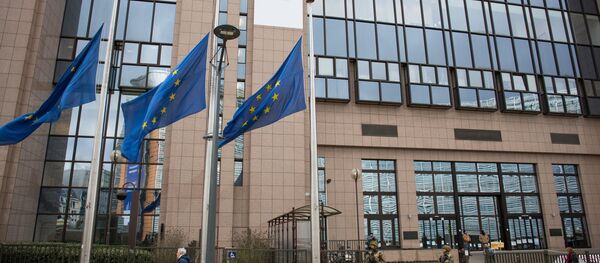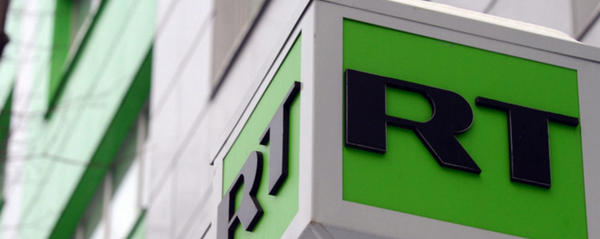Among the main threats to the bloc, the document names the Sputnik news agency and the RT broadcaster.
The non-binding document says that Russia is allegedly "aggressively employing a wide range of tools and instruments" to weaken the EU.
The resolution was presented by Polish lawmaker Anna Elzbieta Fotyga.
The European Parliament is expected to vote on the resolution on Wednesday.
EU lawmakers Tatjana Zdanoka from Latvia (European Greens–European Free Alliance group) and Jean-Luc Schaffhauser from France's National Front (Nations and Freedom group) are pessimistic about the resolution against Russian media. Both lawmakers believe that the parliament will pass the document.
In turn, Schaffhauser told a Sputnik correspondent that he expects a "hundred votes against."
On Wednesday, the resolution is on the agenda, among such important issues as Syria, Turkey and Europe’s collective defense.
A group of lawmakers who endorsed the resolution are part of the "anti-Russian bloc" in the European Parliament. Members of this group form the backbone of the parliament’s Committee on Foreign Affairs.
The committee is headed by Elmar Brok from Germany (European People's Party group).
According to German political researcher and analyst Holger Eekhof, Brok "hates Russia and seeks to unite Europe by any means."
In order to implement the agenda Brok has in his mind, "he wants to have the power over the media" and therefore "has to convince the parliament to accept what he wants," the expert said in an interview with Radio Sputnik.
As for Anna Fotyga, she is one the most avid supporters of Atlantic ideas with the European Parliament.
A source provided Sputnik with an email from parliament’s inner communications. According to it, Fotyga and the Atlantic Council will organize a joint conference in Brussels on November 26 on the Ukrainian crisis. The Atlantic Council is one of the most powerful pro-Atlantic lobbyist groups in the parliament.
Fotyga is known for her clearly ideological approach to the current political environment, particularly to Russia.
Zdanoka said that if the resolution is approved "this would be a disgrace for the entire European Parliament." Several years ago, the lawmaker left her post in the Foreign Affairs Committee.
"This committee wants to teach other countries what to do. This resolution is a piece of propaganda," she added.
"This resolution is farce resulting from a purely ideologically biased approach," Schaffhauser told Sputnik France.
According to the lawmaker, the EU has no reasons to be concerned over "Russian propaganda." Instead, the European Parliament has long been by dominated "American propaganda."
According to him, the resolution reflects Brussels’ intention to establish control over information and media.
He also said that the resolution is anti-European and aimed against European principles of cooperation and partnership.
"Instead of building bridges, this initiative promotes hatred as an ideological approach," Schaffhauser said.
However, the lawmaker said that this initiative is unlikely to result in a new, more hardline approach to third party media in European countries.
"People in Europe are raising their heads. In France, we’ll have two pro-Russian [presidential] candidates, Francois Fillon and Marine Le Pen. Pro-Russian candidates won in Moldova and Bulgaria. This is the reality, so I feel very optimistic about the situation, despite the possible collateral difficulties," Schaffhauser concluded.







